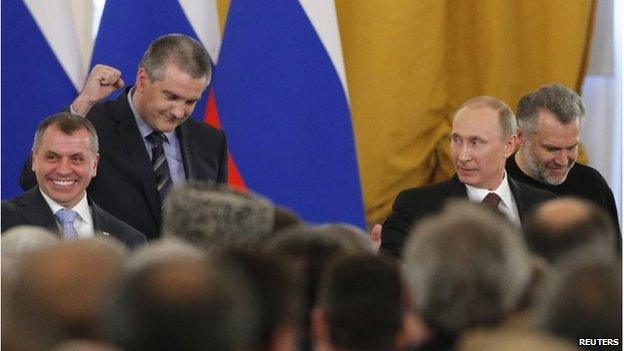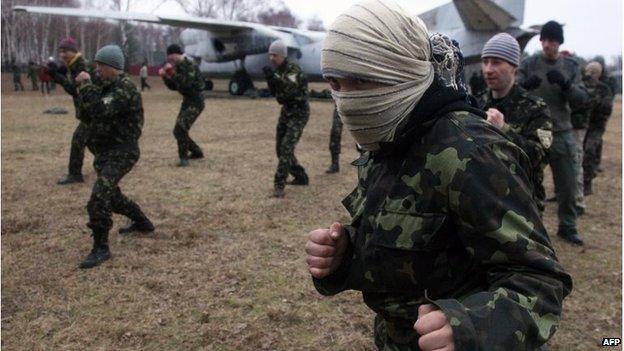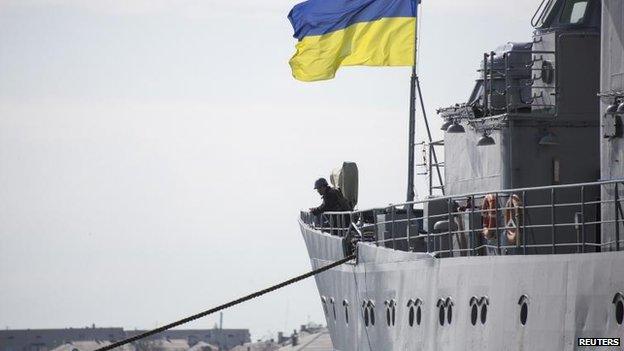Ukraine crisis: Putin signs Russia-Crimea treaty
- Published
After a standing ovation, President Putin told parliament that figures from the Crimea vote were "more than convincing"
President Vladimir Putin and the leaders of Crimea have signed a bill to absorb the peninsula into Russia.
Mr Putin told parliament that Crimea, which was taken over by pro-Russian forces in February, had "always been part of Russia".
Kiev said it would never accept the treaty and the US has called a G7-EU crisis meeting next week in The Hague.
After the signing, Kiev said a Ukrainian serviceman had been killed in an attack on a base in Crimea.
The defence ministry said the attack took place in the capital, Simferopol.
US Vice-President Joe Biden, speaking earlier in Poland, said Russia's involvement in Crimea was "a brazen military incursion" and its annexation of the territory was "nothing more than a land grab" by Moscow.
The Ukrainian foreign ministry said: "We do not recognise and never will recognise the so-called independence or the so-called agreement on Crimea joining the Russian Federation."
Ukraine's interim PM Arseniy Yatsenyuk said the Crimea crisis had moved from the political to the military stage.
Germany and France quickly condemned the Russia-Crimea treaty.
UK Prime Minister David Cameron said: "It is completely unacceptable for Russia to use force to change borders on the basis of a sham referendum held at the barrel of a Russian gun."
Mr Putin later appeared before crowds in Moscow's Red Square, telling them: "Crimea and Sevastopol are returning to... their home shores, to their home port, to Russia!"
He shouted "Glory to Russia" as the crowds chanted "Putin!"
The Ukrainian crisis began in November last year after pro-Moscow President Viktor Yanukovych abandoned an EU deal in favour of stronger ties with Russia. He fled Ukraine on 22 February after deadly protests.
'Historical injustice'
Crimean officials say that, in a referendum held in the predominantly ethnic-Russian region on Sunday, 97% of voters backed splitting from Ukraine.
The EU and US have declared the vote illegal. Travel bans and asset freezes have been imposed on government officials and other figures in Russia, Crimea and Ukraine, but these have been largely dismissed as ineffectual in Russia.

Crimea's head of government celebrated as the signing was completed

Ukraine has begun training reservists, fearing an escalation of the crisis

Ukrainian navy ship Slavutych in Sevastopol. There are reports of deadly unrest at a military base
In a televised address in front of both houses of parliament and Crimea's new leaders, Mr Putin said: "In the hearts and minds of people, Crimea has always been and remains an inseparable part of Russia."
The referendum had been legal and its results were "more than convincing", he said.
"The people of Crimea clearly and convincingly expressed their will - they want to be with Russia," he said, and were no longer prepared to put up with the "historical injustice" of being part of Ukraine.
Crimea was transferred from Russia to Ukraine while under Soviet rule in 1954.
Mr Putin criticised Ukraine's post-uprising leaders and those behind the unrest, saying they were "extremists" who had brought chaos.
He also praised the "courage, bearing and dignity" of Crimeans, and thanked all Russians for their "patriotic feeling".
The West, he said, had behaved "irresponsibly" in backing the uprising, and he denied Russia was interested in annexing more territory.
"Don't trust those who frighten you with Russia... we do not need a divided Ukraine" he said.
Russia "will of course be facing foreign confrontation," he said, adding: "We have to decide for ourselves, are we to protect our national interest or just carry on giving them away forever?"
The audience frequently applauded Mr Putin at length during his emotionally charged speech, and gave him a standing ovation.
The moment Russian and Crimean leaders signed a treaty formalising the absorption of the Ukrainian Black Sea peninsula into Russia
President Putin, Crimea's Prime Minister Sergei Aksyonov, the region's Speaker Vladimir Konstantinov and the mayor of Sevastopol, Alexei Chaliy, then signed a treaty on making the Black Sea peninsula a part of Russia.
Earlier, Mr Putin had recognised Crimea as a sovereign state and approved a draft bill on its accession to the Russian Federation.
The bill must now be approved by the constitutional court and then ratified by parliament.
The BBC's Richard Galpin in Moscow says the process is likely to be completed by the end of the week.
Western powers have roundly condemned Tuesday's treaty.
The UK was suspending "all bilateral military co-operation [with Russia] not subject to treaty obligations", Foreign Secretary William Hague told Parliament.
German Chancellor Angela Merkel said that the referendum, the declaration of independence and Crimea's "absorption into the Russian Federation" were "against international law".
French President Francois Hollande called for a "strong and coordinated European response" to the Russian moves.